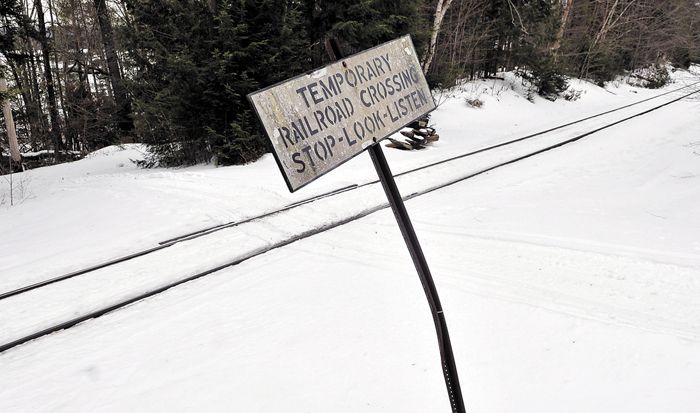BELGRADE — A battle between area residents and Pan Am Railways will reach the State House on Thursday, when legislators hold a public hearing on a bill designed to address the issue.
The outcome will affect anyone in the state who crosses railroad tracks to reach their private land.
The bill limits railroad liability for those who are injured on private crossings, a measure Pan Am said will allow it to craft friendlier agreements with those who use such crossings.
Some residents said they want those friendlier agreements to be included in the bill, rather than relying on Pan Am’s assurances.
The issue began in February 2012, when Pan Am sent new temporary crossing agreements to residents in Belgrade and Oakland, along with letters that informed them that crossing fees were going up — in some cases, dramatically.
Thomas and Kathleen Cassidy, a Winslow couple that owns a camp on Dustin Drive in Belgrade, received a letter that included a fee hike from $130, set in 1972, to $1,470.
Kathleen Cassidy said crossing the tracks is the only reasonable way to get to the land on the shores of Belgrade Lake.
“The only other way to get to my camp is by boat,” she said.
Cassidy said she supports the principle of paying a maintenance fee to cover Pan Am’s crossing maintenance costs.
“I don’t have a problem to pay a crossing fee. It’s only fair. It is their land that we are crossing,” she said.
However, the Cassidys said the amounts are too high and are applied inconsistently, with some residents asked to pay less than a third of what the Cassidys were assessed.
“It should be reasonable and it should be equitable and it should be the same fee for everyone,” she said.
Cassidy said she was speaking only on behalf of herself and her husband.
Other property owners involved in the dispute have said that they oppose any kind of crossing fee.
The Cassidys said the proposed agreement also requires property owners to buy $10 million in insurance coverage for accidents that might happen at the crossing.
A group of residents expressed anger about the new agreements at a public meeting with Pan Am and state legislators in August, after which the railroad temporarily suspended the process.
In an effort to address the concerns, Rep. Dennis Keschl, R-Belgrade, introduced the bill, which is the subject of a public hearing at 1:30 p.m. Thursday in the State House.
The bill is cosponsored by Sen. Tom Saviello, R-Wilton, and Rep. Robert Nutting, R-Oakland, among others.
If the bill passes, private railroad crossings would join recreational and logging areas as places where the railroad is not liable for accidents.
Keschl said the railroad still would be liable if an accident was demonstrably caused by its negligence, but the bill would reduce its insurance costs.
Pan Am Vice President Cynthia Scarano said that if the railroad doesn’t have to insure itself against accidents at the crossings, then it won’t pass along those insurance costs to private landowners.
“This would alleviate the camp owners’ requirement for that insurance,” she said.
The issue of increases in crossing maintenance fees is separate, said Scarano, and would not be affected significantly by the legislation as written.
However, Cassidy said she wants the bill to address both issues at once so property owners are protected from both the insurance costs and from the increased maintenance fees.
“I’m opposed to the legislation the way it’s drafted simply because it gives them everything they want,” she said. “If the law reduces or removes their liability, there’s no motive or reason for Pan Am to act in good faith with the property owners.”
Bryan Ward, an attorney with O’Donnell, Lee, McCowan and Phillips in Waterville, said he will attend the hearing on behalf of an affected Belgrade landowner, whom he declined to name.
During the August public meeting, he said, there was an understanding that the changes in railroad liability would be linked to addressing the residents’ concerns. If the legislation passes without taking care of those concerns, he said, “this would be a potentially undeserved windfall for the company.”
Keschl said he crafted the bill with assistance from Pan Am lawyers.
He said he supports protection for camp owners and others, but didn’t include it in the legislation because the issue is so complicated that he didn’t know how to word it properly.
“My purpose was trying to get the debate started,” he said. “It seems unfair to me that people should have that dramatic increase in liability.”
There are several different types of crossings and existing crossing agreements that would be affected by the legislation, which he said makes it difficult to draft a law that is fair to everyone.
At some crossings, no one pays fees. At others, one property owner may be charged for the usage of others who cross the tracks at the same point. It all adds up to a complex issue, Keschl said.
While the issue is complicated, the right solution could help everyone involved, according to Nate Moulton, director of the Maine Department of Transportation’s Rail Program.
“I look at it as a potential win-win for both of them,” he said.
Scarano said Pan Am is withholding judgment on proposed changes to the legislation because the company isn’t sure how they might affect the hundreds of crossings Pan Am maintains on 387 miles of rail lines throughout the state.
Keschl said the issue, which is confined to the Belgrade Lakes area for now, has implications for the entire state.
“Right now it seems Belgrade-centric, but that’s just because that’s where Pan Am started,” he said.
Scarano confirmed that the process, which began with letters to Belgrade property owners, eventually would be expanded to the entire state; but she said the nature of the agreements and the time line are dependent on what legislation, if any, is approved.
Matt Hongoltz-Hetling — 861-9287
mhhetling@centralmaine.com
Send questions/comments to the editors.


